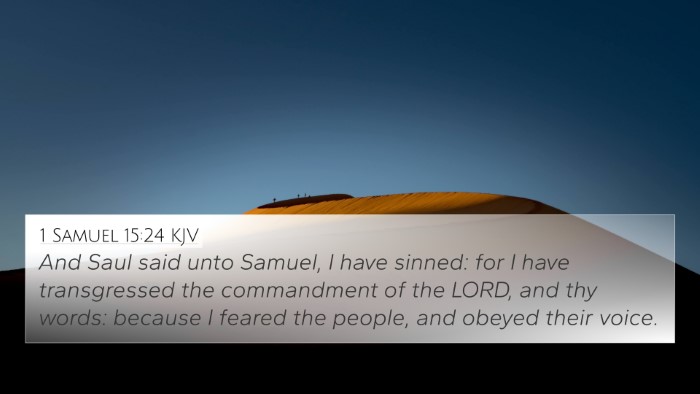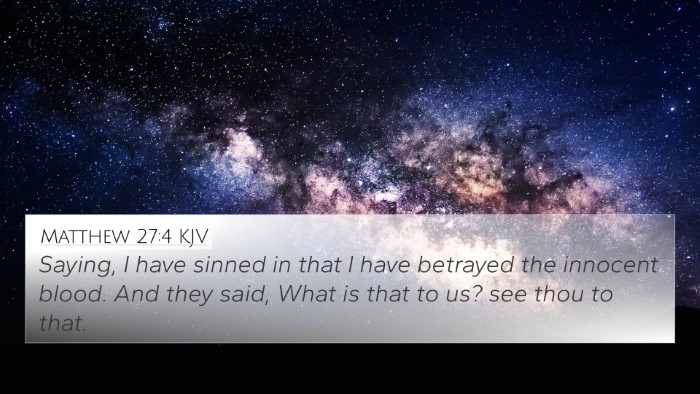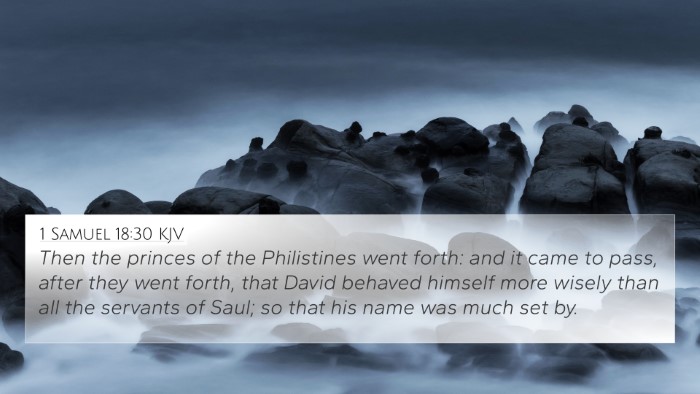Understanding 1 Samuel 26:21
1 Samuel 26:21 states, "Then Saul said, 'I have sinned; return, my son David, for I will no more do you harm, because my life was precious in your eyes this day. Behold, I have acted foolishly, and have made a great mistake.'" This verse is pivotal as it captures Saul's admission of wrongdoing and David's mercy, revealing key themes of repentance, forgiveness, and the dynamics of leadership.
Verse Meaning and Interpretation
This verse reflects a moment of vulnerability for Saul, illustrating the conflict between his position as king and his moral failures. In his conversation with David, Saul acknowledges his wrongdoing and appeals for reconciliation. The verse encapsulates the complexity of human emotion and leadership, where fear, power, and humility intersect.
Insights from Public Domain Commentaries
Matthew Henry's Commentary
Matthew Henry emphasizes Saul's moment of clarity and regret. He notes that this was a rare instance where Saul recognized the value of David's life and expressed sorrow for his prior intentions. Henry explores the theme of God's mercy in allowing Saul to see his folly, suggesting that this remorse could serve as a turning point in Saul’s character development.
Adam Clarke's Commentary
Adam Clarke reflects on this admission as representative of the psychological turmoil within Saul. He elaborates on Saul’s fluctuating nature, torn between his jealousy toward David and the acknowledgment of David’s righteousness. Clarke points out that this passage illustrates how sin can cloud judgment, yet moments of honesty can pave the way for restoration.
Albert Barnes' Commentary
Albert Barnes asserts that Saul’s admission highlights the principle of accountability. He discusses the gravity of Saul’s earlier pursuits to kill David and underscores the importance of David's enduring patience and kindness, which ultimately serves to elevate moral discourse regarding the nature of conflict and resolution.
Thematic Connections
1 Samuel 26:21 has profound thematic connections throughout the Scriptures, illustrating various moral and ethical considerations:
- Repentance: This verse is significant in its portrayal of repentance in biblical narratives, establishing a connection with Psalm 51:10-12, where David himself seeks a clean heart and renewal.
- Forgiveness: The idea of forgiveness is echoed in Matthew 6:14-15, where the teachings of Jesus emphasize the necessity of forgiving others as part of the Christian faith.
- Mercy: The act of showing mercy, as seen in this verse, can also be cross-referenced to Lamentations 3:22-23, highlighting God's enduring mercy toward humanity.
- Moral complexity in leadership: The nature of Saul and David's relationship can be compared to 1 Peter 5:2-3, which addresses the responsibilities and integrity of leaders.
- Conflict resolution: The dynamics highlighted in this verse resonate with James 1:19-20, which teaches about the importance of listening and being slow to anger.
- Human weakness: This scenario exemplifies human frailty, paralleled by Romans 3:23, which states, "For all have sinned and fall short of the glory of God."
- God's Sovereignty: Saul’s recognition of David’s value points to God’s control over earthly affairs, analogous to Proverbs 21:1, which states that the king's heart is like a stream of water in God's hand.
- Trust in God: David's response highlights faith; similar themes are found in Proverbs 3:5-6, where trust in the Lord is encouraged.
- The nature of friendship: This relationship represents the complexities of human relationships, akin to John 15:15, where Jesus speaks of friends sharing truth with one another.
- Divine purpose: Lastly, the greater narrative surrounding Saul and David informs understanding of destiny and purpose as portrayed in Jeremiah 29:11.
Cross-Referencing and Comparative Analysis
This verse serves as a valuable reference point for cross-referencing various thematic elements within the Bible. Here are several Bible cross-reference tools and methodologies to further understand these connections:
- Using a Bible concordance can help locate themes such as mercy and repentance across scriptures.
- A cross-reference Bible study allows for analyzing the interactions between Old and New Testament principles.
- Identifying Bible chain references clarifies the links between characters and their moral standing.
- Engaging in a comparative study of Pauline epistles broadens the understanding of forgiveness taught in different contexts.
- How to use Bible cross-references becomes an essential skill for deeper biblical literacy.
Conclusion
1 Samuel 26:21 serves as a profound reminder of the complexities of human behavior, the potential for repentance and forgiveness, and the nuances of leadership. Its connections to other verses enrich the understanding of biblical themes, making it an essential verse for study and reflection. By employing tools for Bible cross-referencing, believers can engage deeply with the Word, facilitating growth in faith and understanding.













